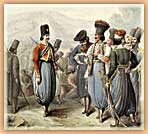 |

Philhellenism in urban Europe was expressed in two main ways.
Committees supporting the Greek Revolution were constituted and many volunteer expeditions were organized to fight by the side of the Greek revolutionaries.
Although their exact number is unknown, it is estimated that more than one thousand arrived in the rebellious regions. One-third of these did not
return. Most came in the first two years of the uprising
while a second wave of volunteers came as a result of the death of Lord Byron in Missolonghi (1824). Among these were people of different social, political, educational and national traits. For the most part, however, they were veteran soldiers and officers of the Napoleonic wars who sought glory and wealth in regional conflicts either because from 1815 and later they had no employment or because they were in disfavour because of their political ideas. The Scots Colonel Gordon and the naval officer Frank Hastings are two such. Many died, others left disappointed, and some returned.
There were also those who went over to the enemy and returned to the
rebellious regions with different intentions or even for the same reasons.
Among the military professionals were people with completely different kind of motives. These were people struggling for a fairer social and political world.
From Lords Byron and Stanhope, wwho shared the ideas of the social philosopher Jeremy Bentham,
to the reknown Italian carbonaro Santarosa, the whole range of European liberal and radical ideas and subversive movements was represented in the Greek Revolution.
Being used to fighting in different armed organizations and following different
military tactics, the European volunteers seem to not have been very efficient in the battlefield. Despite the fact that they had plenty of heroism, they were often exposed to the enemy and incapable of acting against the assault of the armed Ottomans. In the Battle of Peta, in July 1822, one of the most important Greek defeats, the volunteer unit and that of the Ionian Islands were the only ones to suffer crushing defeat.
They underestimated the power of armed local bands, and did not know of the klephtopolemos, nor did they want to fight in this manner. In some cases they caused distrust and even hostility among the locals, who did not want others determining the way they should fight nor did they want foreigners to reap the fruits of the glory and the rich booty of victory. Mutual mistrust was apparent, especially in the sarcastic remarks in the memoirs of fighters, Greeks and foreigners, of the Greek Revolution.
|
 |